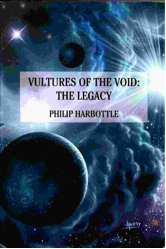Labours of Love:
Philip Harbottle, Vultures of the Void: The Legacy
Algis Budrys, Benchmarks Continued: 1975-1982
reviewed by David Redd
Two remarkable volumes of oral history, gossip, historical research, and observations on writing science fiction

Vultures of the Void: The Legacy Publisher: Cosmos Books (Expanded edition, 2011) Trade paper: 411 pp. ISBN: 978-1-60701-149-1 |
Here are two labours of love: two books about science fiction and fantasy, written and published by genuine enthusiasts, two homegrown harvests of insights into writing, reading, and generally keeping sf alive in an increasingly commercialised world.
Harbottle’s strength is in cautionary tales about publishing, Budrys’ is in guidelines for a writer’s life. Taken together, the books make a fascinating double package for readers, especially if those readers are also writers.
Vultures of the Void: The Legacy is Philip Harbottle’s history of the UK science fiction he has read, published, edited, agented, written about and loved for six decades. Chapters 1-5 sketch the pre-1950 struggles to establish British sf magazines in an uncomprehending publishing scene. Chapters 6-16 — an amazing lucky-dip of revelations — survey the crazy boom years of roughly 1950-55 when both very good sf and very bad sf proliferated mightily as never before. Finally, Chapters 17-21 describe the later efforts by editor Harbottle, author E C Tubb and others to maintain the adventurous spirit of those formative Fifties.
Back in the Fifties, of course, a whole decade’s-worth of creative energy held back by World War II came bursting out. The central chapters of Vultures recreate this explosion for you, with leading players including John Carnell and Kenneth Bulmer recalling the madcap inside stories of UK magazines such as New Worlds, Authentic, Nebula and the later Visions of Tomorrow.
You’ll find fond memories of old books too, including quotations “by popular request” demonstrating just how bad British original paperback sf could be, as if certain covers included in the 166 black-and-white illustrations are not demonstration enough. And you’ll read astonishing tales from the dark underside of publishing, such as the luckless writer imprisoned in a publisher’s cellar, starving and ill, to hack out 10,000 words a day. (Prudently no names are named in that one, but from evidence outside this book I consider the whole horrific story to be absolute truth, albeit dated a few years later than its actual occurrence.)
Harbottle devotes many valuable pages to detailing what books or magazines came out when, who wrote them and who published them; his anecdotes are more colourful than my description conveys, and include some quite personal recollections. Here is one which should send a shiver down the spine of anyone relying on “professional advice.”
After the death of author John Russell Fearn — a Thirties mainstay of Astounding Stories, and a Fifties big seller as “Vargo Statten” — his widow was told by her solicitor that Fearn’s huge legacy of pseudonymous stories was worthless because copyright could not be proved. Moreover, when Mrs Fearn died, Philip Harbottle (to whom she had left the Fearn literary estate) arrived at her house in the nick of time to stop the executor bagging up all Fearn’s manuscripts for destruction. (Some were lost anyway, one I particularly regret being Little Winter, Fearn’s unpublished but heartfelt mainstream novel of theatre life in Blackpool.)
Since then, Harbottle has overseen the recent publication of surely a hundred-plus Fearn books, old and new, including one which I reviewed right here in Bewildering Stories, issue 242. Yet this was material condemned as valueless by both the solicitor and the executor whose duty it was to hand over the legacy! Be warned. (The executor at least did make some amends by later rescuing several further manuscripts.)
Harbottle knows of other missed opportunities. To me, the most tantalising involves the forgotten radio serials about “Dan Dare,” an enormously popular space-adventure hero of children’s comics in the Fifties (and later.) Harbottle describes how in schoolboy enthusiasm he drew his own picture-strip stories based on the serials.
Reading this, I imagined fresh possibilities. Those old drawings of Harbottle’s, the only surviving record of the classic-period radio broadcasts, could provide the storylines for a resurrection of Dan Dare’s lost adventures! I asked Philip Harbottle if it might happen. He replied that the proposal had been made already, and had been rejected. What a disappointment. He had even lined up famed sf cover and comics artist Ron Turner for the artwork, before Turner died and the project went into the limbo where it remains.
So the story of science fiction goes on, beyond this book. Vultures of the Void: The Legacy cannot follow. It is still to be commended for sharing the excitement of those crowded and sometimes insane mid-century years which created the world of British science fiction.
* * *

Benchmarks Continued The F&SF “Books” Columns Volume 1: 1975-1982 Publisher: Ansible Editions via Lulu.com (1st edition, 2012) Trade paper: 267 pp. ISBN: 978-1-300-34659-3 |
Benchmarks Continued, on the other hand, is somewhat more sober, concentrating on the USA experience and nominally reviewing books from a less frenzied era than Harbottle’s core period, but in fact Benchmarks and Vultures complement each other almost perfectly.
Algis Budrys was a first-rank American sf novelist — his Who? has been republished by The Library of America — and a first-rank reviewer and essayist, receiving the 2007 Pilgrim Award for his “lifetime contribution to SF and fantasy scholarship.” He also wrote numerous highly literate short stories and edited/published his own science fiction magazine, Tomorrow. You would expect a volume of Budrys’ book reviews to contain much more than simple notices of new fiction, and you’d be right.
The very first column reprinted here deals with a biography of H P Lovecraft in a highly individual manner. Budrys opens with an excellent 450-word essay on Lovecraft’s life, then appreciatively but briefly reviews the actual biography (a good one by L Sprague de Camp) and finally spends 1500 words discussing Lovecraft’s importance to modern speculative fiction
No newcomer learning about writing should fail to read observations such as this: “Lovecraft ... clung to a naïve confusion between the use of words as symbols to create a systematic progression of fully visible scenes in the reader’s mind, and of words simply as sounds to braid skeins of perfervid declaration.”
Neither should you fail to read and ponder Budrys’ philosophical observations: “The difference between the amateur and the professional is not the matter of money. It is, solely and entirely, the ability to choose not to win.” (And he explains this.)
Budrys is still discussing Lovecraft, but he is also discussing every writer’s life and work, in a timescale of the Twenties to the then-present of the Seventies — and making comments still relevant to us now, another four decades later.
These “Books” columns, I think it worth confirming, are genuinely about books — about reading them, writing them, publishing them, enriching life and liberty with them, promoting the pursuit of happiness with them. Every page is full of insights custom-made for you as a reader and writer.
But don’t skim; in every line Budrys is entertaining, long-winded, curt, stylish, focussed, digressing, opinionated, assertive, and above all concentrated. Not far after his 450-word life of Lovecraft is a tiny footnote on Jerome Bixby, a mini-biography listing Bix’s major accomplishments and making a strong case for him as “an unsung hero of our field” — all in a mere 75 words.
A later footnote achieves a similar feat; it notes that writing shorter works requires different mental operations to those required for writing longer works — and tells us why, again in just 75 words. I’m very impressed.
When Budrys makes the smallest comment, you should pay attention. He reviews The Best of Leigh Brackett, a collection of colourful pulp-adventures by a lady who also scripted films such as The Big Sleep and The Empire Strikes Back, and he commends her to all for her writing skill, creativity, intelligence, poetic visions, and storytelling. “This is a marvelous person. Someone with a tape recorder and good sense should get to her and just listen.”
Perhaps there never was the lengthy oral-history session with Brackett that we should have had, but our own Bertil Falk did visit her in 1975, and the resulting excellent feature fully confirmed Budrys’ point when it eventually appeared in Bewildering Stories, issue 250.
And if you only want book reviews to tell you what to read or to avoid, you’ll find plenty of such reviews here too. Even in these Budrys works hard to extract the maximum possible enlightenment for you; I’ll give just one example. Here he is reviewing a short-story writer’s first novel: “It has a number of good things in it ... but it cries out for another draft ... so we have to take [the novel] as a promise of what will happen when [he] does another long story.”
Then across three well-reasoned pages Budrys dissects the book, revealing its flaws and its promise and how it could be improved, and tells the author to be wary of too-laudatory reviews. His point is that simple polishing would have turned this averagely good book into “a major creative accomplishment by a notable talent.” I assume that the new author took the hint about learning to polish; he was George R R Martin and went on to write Game of Thrones.
Don’t miss any of this. At the end of Benchmarks Continued Budrys reviews Robert Heinlein, Frederik Pohl and an anthology-with-memoirs of F&SF’s early years, and he’s in no way running out of steam but is still endlessly entertaining and enlightening. And still philosophising. “It’s my doctrine that no book ought to be published unless it in some way represents an effort to make things better and clearer to some extent.” If you can read that sentence without asking yourself are you making that effort, you’re not a writer. Or not yet.
And why is Budrys himself putting in this effort, going beyond ordinary reviewing, giving you histories and philosophy and the realities of marketing and the tools of a writer’s craft? Because, like Harbottle in the first book, Budrys cares about this stuff.
* * *
In sum, we have here two books by people who care, two authors who cover interlocking territories, two gift-offerings of mutually illuminating stories. Dip into them; pull out whatever resonates with you. Vultures of the Void and Benchmarks Continued seem very different in style and intent, but together they provide all the gossip, history and research you could wish for in a tour of our arc from there to here, from the pulps and Lovecraft all the way along to Pohl and to you trying to set down words today.
All you could wish for? No, an interested reader could indeed wish for more than appears here. Fortunately two further volumes of the Budrys are to follow.
Copyright © 2013 by David Redd

